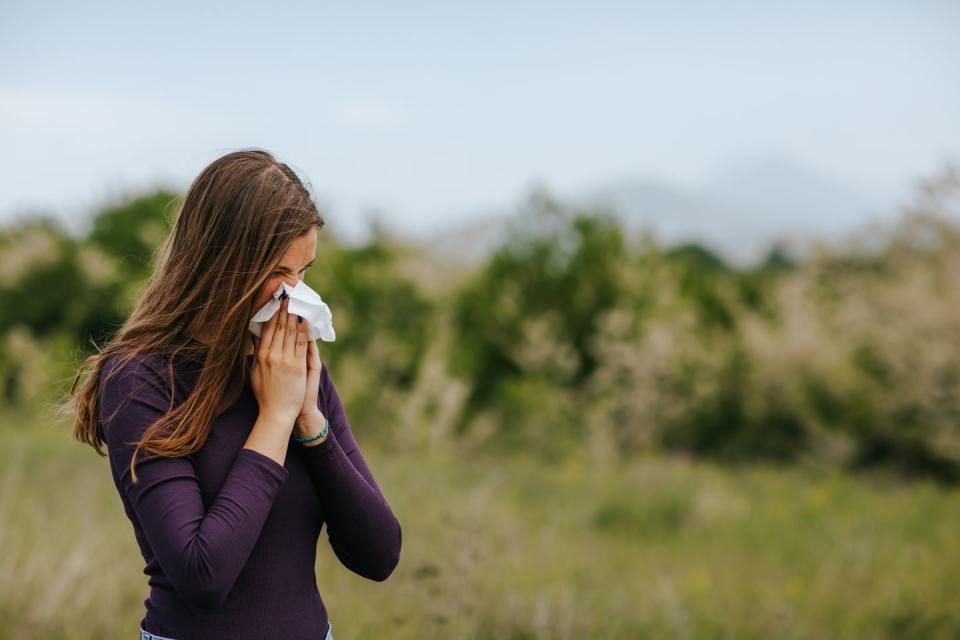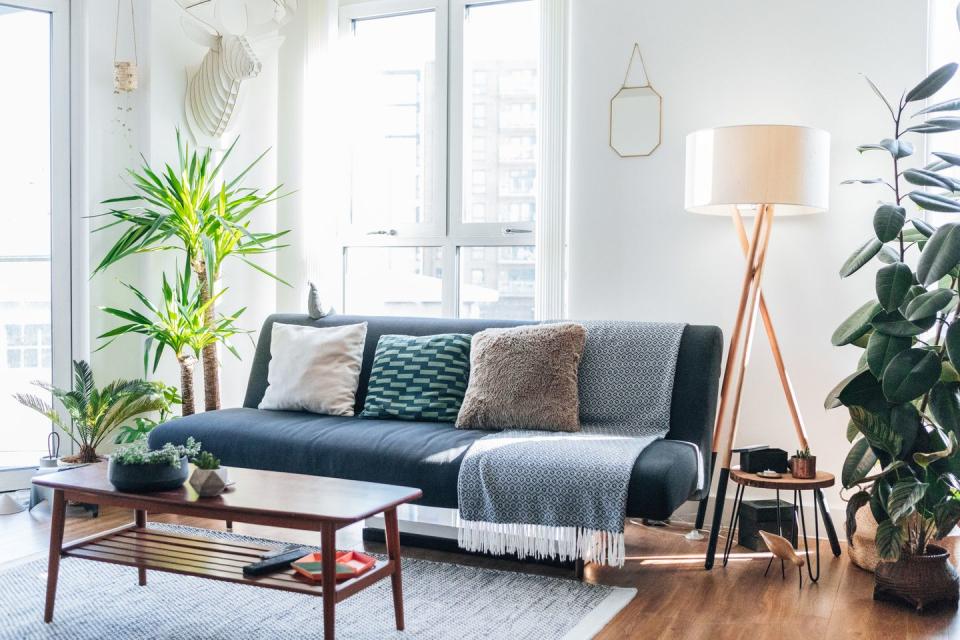Why your hay fever feels so much worse this year

Hay fever is something of a curse for anyone who suffers from it. The perpetual sneezing / itchy eyes / scratchy throat that come on the moment there's an inch of sun in the sky is such a drag, and I don't know about you but I have already spent a small fortune on antihistamine that doesn't even seem to touch the sides.
Sadly for the hay fever sufferers out there, if you've had a sneaky suspish that your pollen allergy feels about 6,000 times worse this year, I'm afraid I've got some bad news: you're probably on to something. According to the experts, hay fever can feel worse this year for a number of unfortunate reasons - largely to do with COVID. Just another thing we can blame on the pandemic.
"Over the last year, social distancing restrictions have meant that we’ve spent more time indoors than perhaps we usually would. As a result, you may have been exposed to less pollen than usual, and this could make your hay fever feel worse," Dr Naveen Puri, Associate Clinical Director at Bupa Health Clinics, tells Cosmopolitan. She goes on to explain that "we build up a certain level of immunity to pollen when we spend time outside, so without that exposure you may be less immune than you usually would be to pollen."
So that's why the sneezing fits have been next level over the past couple of weeks. Just another downside of the lockdown that's dictated our lives for the past year....

But there are a number of other lockdown-related reasons why hay fever may be feeling worse for you right now, which have nothing to do with immunity to pollen. If you went wild buying house plants or flowers during lockdown, Dr Puri warns they have "the potential to cause airborne allergens because of their pollen production." This, the doctor explains, "may leave you suffering from a runny nose or itchy eyes and could even make your hay fever worse." Dr Puri also advises regularly checking house plants for mould, and removing any dead leaves, because these things are known to trigger allergy symptoms.
A lot of people have also invested in a pet over the past year for some companionship. And while this can provide a real benefit to mental health, the doctor also warns that domestic animals can also worsen hay fever symptoms. Sorry to your new pup.
"Pet hair acts as a carrier of airborne allergens (such as pollen)," explains Dr Puri. "There are a few ways to reduce your risk, for example avoid letting your pet sleep on your bed, or in your bedroom."

We know hay fever symptoms aren’t generally serious, but they do get in the way of your day-to-day life and can be frustrating. Streaming eyes and smudged mascara is not the look you envisioned for your big return to the social scene. So if you want to try to ease your symptoms, follow Dr Puri's advice:
Check the pollen count
"With restrictions eased, it’s likely you’ll be spending more time outdoors. Grass and tree pollen are highest around May to July, so it’s important to be prepared," says the doctor. "Before you head outside, check the pollen count – if it’s particularly high, you can take precautions to reduce your exposure. You can check your local area’s pollen count on the Met Office forecast."
Keep windows shut
"Where possible, keep your windows closed, especially in the evening when the pollen count is often higher. If you’re struggling to keep cool, try an indoor fan to keep the rising temperature at bay."
Wash away the pollen
"Your clothing and hair can all carry pollen," notes Dr Puri. "To reduce your symptoms, take a quick shower and change your clothes after spending time outside. Consider washing your hair before you go to bed; otherwise all the pollen trapped in your hair during the day rubs off on your pillow and can trigger your hay fever even more." Wise words indeed. Also, when you wash your clothes, the doctor suggests avoiding drying them outside on the washing line, where they could pick up more pollen.

Protect your eyes and nose
"The classic symptoms of hay fever start when pollen encounters your nose and eyes. You may find it helpful to wear wraparound sunglasses and using a nasal filter to ease your symptoms," says the doctor. Yeah, perhaps not quite the look you'd hoped for now we're finally allowed back in pub gardens. An alternative idea is to put a barrier balm (for example Vaseline) around your nose to prevent pollen contact, and to trap pollen that would enter your throat and lungs through your nostrils. Perhaps a more workable option.
Take medicine
"There are many different medicines for hay fever, including tablets, nasal sprays, and eye drops," explains Dr Puri. "You can buy many of these over the counter from your local pharmacy or in the supermarket. If you’re unsure, speak to your pharmacist and they’ll recommend the right medicine for you to try. These can be taken regularly through hay fever season, or on an ‘as required’ basis, where you can step-up your treatment on particularly troublesome days. This allows you to take greater control of your response to your hay fever," she says.
God speed for the rest of summer 2021, and make sure you're stocked up on Kleenex.
Follow Cat on Instagram.
You Might Also Like


